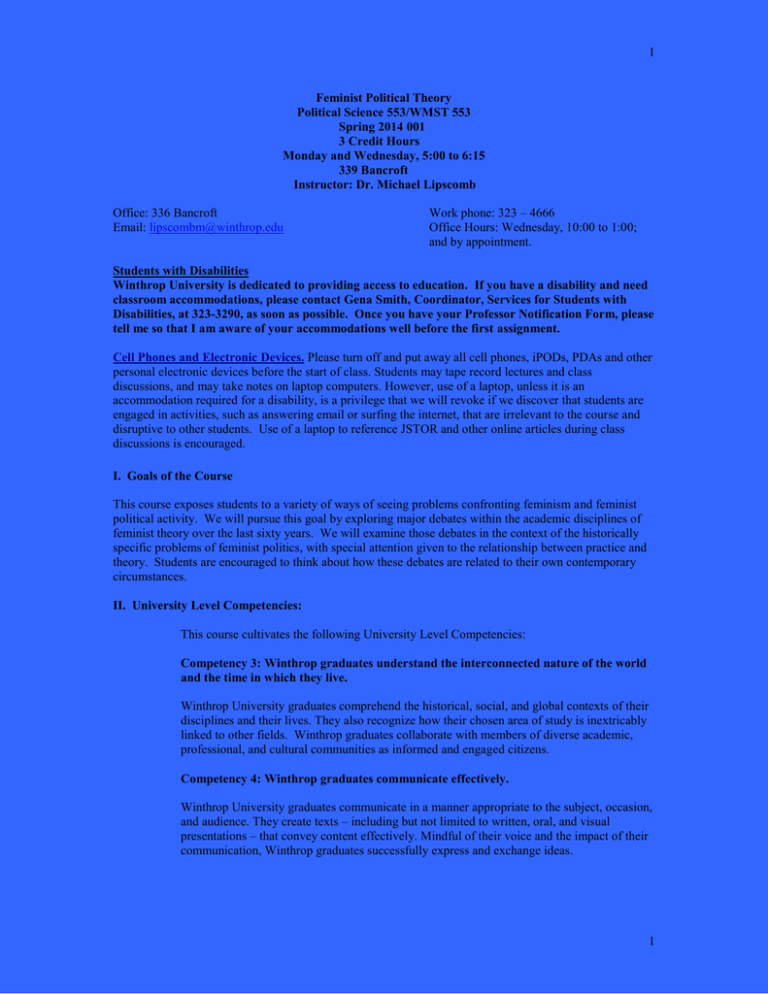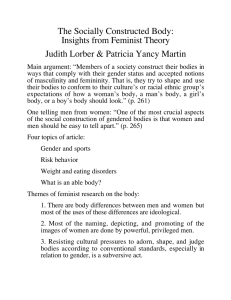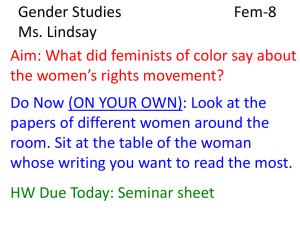1 Feminist Political Theory Political Science 553/WMST 553
advertisement

1 Feminist Political Theory Political Science 553/WMST 553 Spring 2014 001 3 Credit Hours Monday and Wednesday, 5:00 to 6:15 339 Bancroft Instructor: Dr. Michael Lipscomb Office: 336 Bancroft Email: lipscombm@winthrop.edu Work phone: 323 – 4666 Office Hours: Wednesday, 10:00 to 1:00; and by appointment. Students with Disabilities Winthrop University is dedicated to providing access to education. If you have a disability and need classroom accommodations, please contact Gena Smith, Coordinator, Services for Students with Disabilities, at 323-3290, as soon as possible. Once you have your Professor Notification Form, please tell me so that I am aware of your accommodations well before the first assignment. Cell Phones and Electronic Devices. Please turn off and put away all cell phones, iPODs, PDAs and other personal electronic devices before the start of class. Students may tape record lectures and class discussions, and may take notes on laptop computers. However, use of a laptop, unless it is an accommodation required for a disability, is a privilege that we will revoke if we discover that students are engaged in activities, such as answering email or surfing the internet, that are irrelevant to the course and disruptive to other students. Use of a laptop to reference JSTOR and other online articles during class discussions is encouraged. I. Goals of the Course This course exposes students to a variety of ways of seeing problems confronting feminism and feminist political activity. We will pursue this goal by exploring major debates within the academic disciplines of feminist theory over the last sixty years. We will examine those debates in the context of the historically specific problems of feminist politics, with special attention given to the relationship between practice and theory. Students are encouraged to think about how these debates are related to their own contemporary circumstances. II. University Level Competencies: This course cultivates the following University Level Competencies: Competency 3: Winthrop graduates understand the interconnected nature of the world and the time in which they live. Winthrop University graduates comprehend the historical, social, and global contexts of their disciplines and their lives. They also recognize how their chosen area of study is inextricably linked to other fields. Winthrop graduates collaborate with members of diverse academic, professional, and cultural communities as informed and engaged citizens. Competency 4: Winthrop graduates communicate effectively. Winthrop University graduates communicate in a manner appropriate to the subject, occasion, and audience. They create texts – including but not limited to written, oral, and visual presentations – that convey content effectively. Mindful of their voice and the impact of their communication, Winthrop graduates successfully express and exchange ideas. 1 2 III. Required Text Feminist Theory Reader: Local and Global Perspectives, Carole McCann (Editor), Seung-kyung Kim (Editor), Routledge, 2013. IV. Assignments 1) Attendance is not optional, and will be taken daily. I will excuse absences because of religious holidays, but it is your responsibility to inform me that this is the reason for your absence. I will also excuse absences caused by sickness or family emergency if you provide me with proper written documentation. 2) You are expected to have completed all reading assignments before you come to class. 3) You will be graded on both the frequency and quality of your participation in class discussions and, when appropriate, class exercises. 4) To make sure that you keep up with and understand the readings, and to facilitate lively class discussion, you will be given pop quizzes throughout the semester. 5) Each student will be a seminar leader for two different class periods. We will talk about this responsibility in class, but for your turns as a seminar leader, you must submit 4 – 5 discussion questions for that class’s assigned reading by Sunday, 5 PM, the week of your assignment. Your questions and your contributions to class discussion that week (that is, the degree to which you and the other seminar leaders are able to generate lively, focused, and intelligent discussion) will be counted as a quiz grade. 6) You will take a midterm. 7) You will take a final during the final exam period at the end of the semester. 8) You will write and research a term paper on a topic pertaining to feminist political theory. The paper length is 15 to 20 pages. Your discussion must be supported by reasoned argument and reliable evidence, and your papers will be graded on both the quality of their content and the competency with which they are written. A paper proposal and annotated bibliography is due February 19th, at which time you will present your topic to the class. Together, this proposal and its presentation will count 10% of your final grade. A rough draft, also counting 10%, will be due March 26th. I will use your draft to make suggestions about how you might improve your final draft, due April 26th . 9) All written work will be penalized half a letter grade (four points) for each day that it is late. This policy will be strictly enforced. Additional Assignments for Graduate Students: 1) The length of the term paper for graduate students will be between 25 and 30 pages. 2) For the days that they are seminar leaders, graduate students will write a 5 page review essay of the work under consideration. Your paper will count the equivalent of 4 pop quizzes. V. Student Learning Activities 1) The reading assignments that you are assigned to have completed before you come to class, and the work that you have to do to master these readings, is a primary learning activity. 2) To help make sure that you keep up with and understand the readings, and to help reinforce that learning, another major student learning activity will be pop quizzes given throughout the semester. 3) Your participation in class discussions and, when appropriate, class exercises is a major student learning activity. 4) The midterm taken during the semester is a student learning activity. 5) A final, in-class, exam will be a cumulative student learning activity. 6) The term paper (and all associated assignments) is a student learning activity. 2 3 VI. Global Learning Initiative Components of the Course The global learning components of this course include a consideration of the different interests and concerns that arise in different geographical, cultural, economic, and social contexts. VII. Political Science Department Statement on Plagiarism and Academic Misconduct The Winthrop University Political Science department abhors all forms of academic misconduct, and faculty members aggressively investigate all incidents of suspected cheating. This includes, but is not limited to, using turnitin.com. Plagiarism, whether intentional or unintentional, is by far the most common form of academic misconduct in the Political Science department. Plagiarism includes, but is not limited to: Using the words or ideas of others as one’s own; Reproducing, in whole or in part, principal ideas from a fellow student’s work; Granting a fellow student permission to copy one’s paper, or to reproduce some or all of its principal ideas; Quoting or paraphrasing material from sources without any citation; Quoting or paraphrasing material without sufficient and/or proper citation; Omitting some or all sources used in a paper; and Submitting a paper written for one course -- whether in Political Science or another discipline -to meet a course requirement in a second course, without the express permission of all instructors involved. This is the case even though many paper topics may be relevant to several different courses. All incidents of suspected academic misconduct are investigated with equal vigor. When a faculty member suspects that a student engaged in academic misconduct, the faculty member will follow the appropriate procedures outlined in the Student Handbook. The faculty member will apply whatever sanctions s/he deems appropriate. Possible sanctions include, but are not limited to: Failing the assignment; Requiring a student to repeat an assignment for reduced credit; Requiring a student to repeat an assignment for no credit; or Failing the course. Academic misconduct applies equally to required assignments and extra credit assignments. All incidents of academic misconduct will be reported to the Department Chair, the Dean of Students, the Dean of Arts and Sciences and the student’s academic advisor. The University may impose its own sanctions in addition to sanctions imposed by the faculty member or the department. The University may impose sanctions even after a student has graduated, and may include revoking a student’s diploma. In addition, students who engage in more than one incident of academic misconduct may be declared ineligible for departmental awards, ineligible for employment in the department or its affiliated programs, and ineligible to volunteer as a peer advisor. Adopted August 14, 2007. In this course, any act of plagiarism or academic dishonesty will result in an “F” for the course and will lead to appropriate administrative action. Ignorance as to what constitutes plagiarism or other forms of academic dishonesty is not a valid excuse for such transgressions. For further clarification about matters of academic dishonesty, students should consult Section V of the Student Conduct Code in the Student Handbook. For specific questions about plagiarism, the Writing Center, located on the second floor of Bancroft, is an excellent resource. The Center’s web page (www.Winthrop.edu/wcenter) has specific links 3 4 that can help you with questions about how to cite source material and how to avoid plagiarism. Your instructor is more than glad to talk to you about these matters. VIII. Grading Scales UNDERGRADUATE STUDENTS: For all undergraduate students, grades of A through F will be determined based on the following numerical scale: 100 – 94 93 – 90 89 – 87 86 -84 83 – 80 79 – 77 76 – 74 73 – 70 69-65 64 – 60 59 and below A AB+ B BC+ C CD DF GRADUATE STUDENTS: For all graduate students, grades of A through F will be determined based on the following numerical scale: 100 – 94 93 – 90 89 – 87 86 -84 83 – 80 79 – 77 76 – 74 73 – 70 69 and below A AB+ B BC+ C CF IX. Final Grade Distribution Pop Quizzes Participation Term Paper Proposal& Presentation Rough Draft Term Paper Midterm Final 10% 10% 10% 10% 20% 20% 20% X. Grading Criteria For Written Work I will grade your written work using the General Education Writing Competency Rubric developed by the English Department., which can be accessed at: http://www.winthrop.edu/uploadedFiles/sacs/qep/Focus_HMXP%20Rubric.pdf. XI. Schedule The instructor reserves the right to make changes to this schedule and to add reading assignments as he sees fit, depending on the unfolding needs of the class. Any such changes will be announced in class, and it is the sole responsibility of the student to be aware of such changes. 4 5 Date Reading Assignment Seminar Leaders Jan 13 Introduction Lipscomb Jan 15 McCann and Kim, “Introduction: Feminist Theory: Local and Global Perspectives,” 1 – 7 Lipscomb Jan 20 McCann and Kim, Section I: Theorizing Feminist Times and Spaces, “Introduction,” 11 – 25. No Class in recognition of Martin Luther King’s Birthday No Class in recognition of Martin Luther King’s Birthday Writing Assignment Due Dates and Test Dates No Class in recognition of Martin Luther King’s Birthday Akiko, “The Day the Mountains Move,” 30. Jan 22 Jan 27 Feb 3 Feb 5 Feb 10 Hewitt, “Re-Rooting American Women’s Activism: Global Perspectives on 1848,” 32 – 39. De Beauvoir, “The Second Sex: Introduction,” 40 – 48. Nicholson, “Feminism in ‘Waves’: Useful Metaphor or Not?” 49 – 55. Thompson, “Multiracial Feminism: Recasting the Chronology of Second Wave Feminism,” 56 – 67. Basu, “Globalization of the Local/Localization of the Global: Mapping Transnational Women’s Movements,” 68 – 76 Rowley, “The Idea of Ancestry: of Feminist Genealogies and Many Other Things,” 77 – 82. Rukeyser, “The Poem as Mask,” 84. Reed, “The Poetical is the Political: Feminist Poetry and the Poetics of Women’s Rights,” 85 - 87 Kandiyoti, “Bargaining with Patriarchy,” 98 – 106. Pateman, “Introduction: The Theoretical Subversiveness of Feminism,” 107 – 112. 1) _______________ 2) _______________ 3) _______________ 4) _______________ 1) _______________ 2) _______________ 3) _______________ 4) _______________ 1) _______________ 2) _______________ 3) _______________ 4) _______________ 1) _______________ 2) _______________ 3) _______________ 4) _______________ Martnez, “La Chicana,” 113- 115. The Combahee River Collective, “A Black Feminist Statement,” 116 – 122 5 6 Feb 12 Firestone, “The Culture of Romance,” 123 – 128. Bunch, “Lesbians in Revolt,” 129 – 133. Feb 17 Feb 19 Feb 24 Feb 26 Mar 3 Correa and Petchesky, “Reproductive and Sexual Rights: A Feminist Perspective,” 134 – 147. Leslie-Feinberg,”Transgender Liberation: A Movement Whose Time Has Come,” 148 – 158. Term Paper Proposal Presentation McCann and Kim, “Section II: Theorizing Intersecting Identities: Introduction,” 159 – 173. Thornton Dill and Enid Zambrana, “Critical Thinking About Inequality: An Emerging Lens,” 176 -186. Hartmann, “The Unhappy Marriage of Marxism and Feminism: Towards a More Progressive Union,” 187 – 201. Salazar-Parrenas, “Servants of Globalization: Women, Migration, and Domestic Work,” 202 - 217 Abu-Lugod, “Orientalism and Middle East Studies,” 218 -226. Sinha, “Gender and Nation,” 227 – 245. March 5 March 10 “One is Not Born a Woman,” 246 – 251 Connell, “The Social Organization of Masculinity,” 252 – 263. Rushin, “The Bridge Poem,” 266 – 267. Jordan, “Report from the Bahamas,” 268 – 276. March 12 Anzaldua, “The New Mestiza Nation: A Multicultural Movement,” 277 – 284. Bruce Pratt, “Identity: Skin, Blood, Heart,” 285 – 291. Lorde, “I Am Your Sister: Black Women Organizing Across Sexualities,” 292 – 295. 1) _______________ 2) _______________ 3) _______________ 4) _______________ 1) _______________ 2) _______________ 3) _______________ 4) _______________ Term Paper Proposal Presentation Term Paper Proposal Presentation 1) _______________ 2) _______________ 3) _______________ 4) _______________ 1) _______________ 2) _______________ 3) _______________ 4) _______________ 1) _______________ 2) _______________ 3) _______________ 4) _______________ 1) _______________ 2) _______________ 3) _______________ 4) _______________ 1) _______________ 2) _______________ 3) _______________ 4) _______________ 1) _______________ 2) _______________ 3) _______________ 4) _______________ Cantu, Luibheid, and Stern, “Well Founded Fear: Political Asylum and The Boundaries 6 7 March 17 March 19 March 24 March 26 of Sexual Identity in the U.S.-Mexico Borderlands,” 296 – 305. Spring Break Spring Break McCann and Kim, “Section III: Theorizing Feminist Knowledge and Agency: Introduction,” 343 – 352. Hartsock, “The Feminist Standpoint: Toward a Specifically Feminist Historical Materialism,” 354 – 369. Narayan, “The Project of Feminist Epistemology: Perspectives From a Nonwestern Feminist,” 370 – 378. March 31 Collins, “Defining Black Feminist Thought,” 379 – 394. Calhoun, “Separating Lesbian Theory From Feminist Theory,” 395 – 411. April 2 Haraway, “Situated Knowledges: The Science Question in Feminism and the Privilege of Partial Perspective,” 412 – 423. Irigaray, “This Sex Which is Not One,” 426 – 432. April 7 Mani, “Multiple Mediations: Feminist Scholarship in the Age of Multinational Reception,” 4433 – 446. Bartky, “Foucault, Femininity, and Modernization of Patriarchal Power,” 447 – 461. 1) _______________ 2) _______________ 3) _______________ 4) _______________ 1) _______________ 2) _______________ 3) _______________ 4) _______________ Rough Drafts of Term Paper Due 1) _______________ 2) _______________ 3) _______________ 4) _______________ 1) _______________ 2) _______________ 3) _______________ 4) _______________ 1) _______________ 2) _______________ 3) _______________ 4) _______________ Butler, “Perfomrative Acts and Gender Constitution: An Essay in Phenomenology and Feminist Theory,” 462 – 473. April 9 April 14 McCann and Kim, “Introduction: Imagine Otherwise,” 477 – 484 Jaggar, “Love and Knowledge: Emotion in Feminist Epistemology,” 485 – 501. Davis, “Reclaiming Women’s Bodies: Colonialist Trope or Critical Espistemology?” 502 – 516. 1) _______________ 2) _______________ 3) _______________ 4) _______________ 1) _______________ 2) _______________ 3) _______________ 4) _______________ Ahmed, “Multiculuralism and the Promise of Happiness,” 517 – 532. April 16 Clifton, “Lumpectomy Eve,” 533. Mohanty, “ ‘Under Western Eyes’ Revisited: Feminist Solidarity Through 1) _______________ 2) _______________ 7 8 Anticapitalist Struggles,” 536 – 552. April 21 April 23 April 28 Walters, “From Here to Queer: Radical Feminism, Postmodernism, and the Lesbian Menace (Or, Why Can’t A Woman Be More Like a Fag?),” 553 Moya, “Chicana Feminism and Postmodernist Theory,” 571 – 588. 3) _______________ 4) _______________ Ndlovu, “Out of Now-Here,” 589 – 590. Presentations 1) _______________ 2) _______________ 3) _______________ 4) _______________ Presentations Presentations Presentations Final Drafts of Paper due in class The Final Exam for this class is scheduled for 3:00 PM,. Saturday, 5/3. The final must be taken on this date unless you have two other exams on the same day. Travel plans are NOT a legitimate excuse for rescheduling the exam. 8








